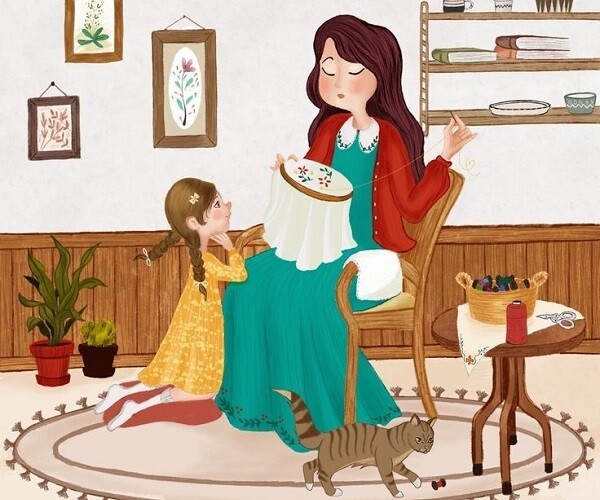A mother’s emotional state greatly impacts the family dynamic. When a mother is anxious, the family tends to mirror that anxiety. This highlights the crucial role mothers play in maintaining harmony and fostering positive emotions within the family unit.
All mothers strive to be the best they can be for their children. However, research suggests that there are specific maternal styles that children tend to favor.


The Optimistic Mother: Nurturing Positive Mindsets
Psychology posits a theory of “social referencing” regarding emotions, suggesting that children, when faced with uncertainty, will seek emotional cues from their mothers before deciding whether to approach or avoid a situation.
Infants as young as nine months old can understand the basic facial expressions of adults, and they use their mother’s facial expressions as a reference point for their own emotions. For instance, if a mother is angry, the baby might look sad, and when a mother smiles, the baby will likely smile back.
Thus, an optimistic and cheerful mother brings sunshine into the family. When a mother maintains a positive attitude, children learn to approach life with a similar outlook, even in challenging circumstances.
Optimistic mothers tend to find the silver lining in every situation, motivating themselves and spreading positivity to other family members. Children learn valuable lessons about patience and resilience from such an attitude.

Optimistic mothers find the silver lining in any situation.
The Fun-Loving Mother: Creating a Happy Childhood
Being approachable and fun-loving is a unique educational approach. It adds excitement and vibrancy to a child’s formative years. When a mother is cheerful, children feed off that positive energy, forming beautiful memories and enriching experiences during this crucial stage of their lives.
A fun-loving mother can transform mundane moments into thrilling adventures. A simple afternoon can become a journey of discovery when a mother engages her children in creative play, enchanting stories, or colorful crafts.
She might also encourage children to express themselves through music, dance, or art. When a mother joins in the fun, the atmosphere becomes lighthearted and joyous.

A cheerful mother brings positive energy to her children.

The Respectful Mother: Teaching Self-Respect and Empathy
Every child is a unique individual, and their ideas and opinions deserve respect. When a mother demonstrates respect for her child’s thoughts, feelings, and decisions, the child learns that their voice matters. This fosters self-respect and self-love.
As children grow and develop their social circles and sense of privacy, a respectful mother will give them the space to cherish their “little secrets.”
Moreover, when a mother respects her child, the child learns to respect others. Mothers can create situations where children practice listening to and understanding others’ perspectives, thereby building communication and empathy skills.
For instance, when a child has a differing opinion on an issue, a mother can engage in a discussion by asking, “Why do you think that way?” This exploration encourages children to feel that their perspectives are valued, prompting them to confidently express their thoughts in other situations.

Teaching self-respect and empathy.

The Mother Who Says “No” Less Often: Encouraging Freedom and Exploration
According to psychology experts, mothers should try to avoid saying “no” too frequently to their children. Excessive behavioral restrictions can stifle a child’s nature and lead to timidity. When children are not encouraged to express themselves freely, they may lose confidence and their sense of adventure.
Children develop at their own pace, and when mothers try to control them with adult standards and rules, it can create a vicious cycle of “anxiety-pressure-confrontation.” This dynamic breeds family tension and negatively impacts children’s psychological development.
Instead, mothers should strive to create an environment that encourages children to explore and learn from their mistakes. Guiding children through questioning, rather than commanding, such as asking, “What do you think will happen if we try this approach?” helps develop critical thinking skills and fosters a deeper connection between mother and child.

Encouraging freedom and exploration.

The Mother Who Avoids Comparisons: Celebrating Individuality
In reality, many parents unconsciously compare their children to others.
However, a wise mother knows how to capitalize on her child’s strengths and avoid focusing on their weaknesses. She creates a stress-free environment, allowing her child to flourish and reach their full potential. By emphasizing a child’s strengths, a mother encourages the development of skills and talents.
Psychology recognizes the “self-fulfilling prophecy” effect: when parents communicate that “You’re not good enough, you’re not as capable as others”, children are more likely to fulfill that prophecy. This happens because children internalize the pressure and lose motivation, leading to a self-limiting belief system.

Avoiding comparisons and celebrating individuality.

The Mother Who Keeps Her Promises: Building Trust
A mother who keeps her promises builds a foundation of trust with her children. This trust is a valuable lesson for children, teaching them the importance of commitment. When a mother consistently fulfills her promises, children learn that reliability is a cornerstone of healthy relationships.
The bond between mother and child deepens, and this forms a solid basis for the child’s holistic development.

Keeping promises builds trust and respect.































